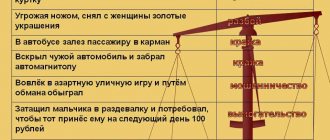Distinguishing between robbery and robbery
These two different crimes are united by one goal: to deprive a citizen of his property through criminal acts, such as the use of violence or threats of violence. The method and method of commission are significantly different, therefore the main difference between these crimes is the degree of threat to the health or life of the victim (Article 161, Article 162 of the Criminal Code (Criminal Code) of the Russian Federation).
Let's break down both crimes by factors using the table below.
| Robbery | Robbery | |
| act | attempt on property using violence or threat of violence | attempt on property without violence |
| intent | taking the victim's property through violent acts | taking property without violence |
| the crime is considered committed | from the moment of use of violence or threat of violence | from the moment of taking possession of the property |
| method of committing | with the use of obviously dangerous objects (weapons, etc.) | without the use of dangerous objects or using their imitation |
The line between the described criminal acts is very thin. Let's give an example: a criminal attacked his victim in the dark, threatening him with a toy gun, and took away his wallet. It would seem that a robbery has been committed, but the court may assess this situation differently, because the victim did not know that the gun was not real, and therefore gave up her property without resistance. Consequently, the commission of this crime can be qualified as robbery.
The essence of robbery is that when criminal intentions are implemented, there is, first of all, a threat to the health and life of the victim, and only then to his property. During robbery, property interests come to the fore.
More information about the article for robbery under the Criminal Code of the Russian Federation can be read here https://lexconsult.online/8621-razboi-ponyatie-i-sostav-prestupleniya
Methods of committing extortion
The defining element of the forensic nature of extortion is the method of committing the crime.
All methods of committing extortion, depending on the means of influencing the victim, are divided into the following groups (Articles 95, 148 of the Criminal Code):
- Group 1 – threat of violence, in particular mental violence (threat in words, through communication, through sound recording and writing); the level of mental violence can be of a different nature - from the threat of beatings to murder;
- Group 2 – threat of disclosing disgraceful data and information;
- Group 3 – threat of damage or destruction of property.
An obligatory and necessary feature of the objective side of extortion is extortionist demands - an offer expressed in a specific, decisive form to the victim from the perpetrator to transfer someone else's property, rights and perform actions of a property nature.
Extortion demands are made in different ways: in writing, orally, by fax, telephone, or through mail. The claim may be addressed to the owner of the property, who is the legal owner, or under whose protection the property is located. On this basis, extortion is distinguished from robbery and robbery.
The place where extortion is committed is usually: the place of work or place of residence of the victim; if extortion is committed against a minor, then the place of extortion can be a school, a sports ground and any place where young people gather. Extortion can be carried out remotely using the latest technical means. In this case, the place where the crime was committed is the place where the victim learned about the demand.
Extortion is considered completed from the moment when this demand was brought to the attention of the victim, from the moment when coercive actions have already been committed by the subject and resulted in a specific psychological effect in the victim, recorded in various manifestations and indicating the constraint of the person’s behavior.
The difference between extortion and arbitrariness
Extortion is a crime characterized by the taking of someone else's property under the influence of blackmail, threats and other moral pressure. For example, a boss extorts a certain amount of money from a subordinate in order to give him a promotion. We will tell you what the expected punishment for extortion is in the article here.
Arbitrariness , in accordance with Art. 330 of the Criminal Code of the Russian Federation, this is the unauthorized and conscious performance of any actions regarding someone else’s property without notification of this. For example: a citizen at his dacha, of his own free will, moved his fence to his neighbor’s territory. This act may be qualified as arbitrariness.
Extortion differs from arbitrariness in that the ultimate goal of the former is to obtain property, while the latter may not have such a goal.
The main difference between extortion and arbitrariness from robbery and robbery is that the main driving force of these crimes is moral, and not just physical, pressure on the victim. If, in the process of a criminal act, threats turned into action, then such a crime will be considered as part of another crime - robbery.
Another nuance of extortion is the prolongation of moral pressure, i.e. it is aimed at obtaining material benefits not at this moment, and the purpose of robbery is to seize property here and now.
Extortion, criminal legal characteristics, features of the investigation.
With this article, I begin a series of articles devoted to the problems of investigating criminal cases in the field of economic activity. In my articles, I will try to describe in detail the features of the investigation of cases of this category, as well as give detailed characteristics of the crimes.
1. Extortion, criminal legal characteristics.
Extortion is one of the types of violent and mercenary crimes, liability for which is provided for in Article 163 of the Criminal Code of the Russian Federation.
In accordance with the norms of criminal law, extortion is a demand for the transfer of someone else’s property or the right to property or the commission of other actions of a property nature under the threat of violence or destruction or damage to someone else’s property, as well as under the threat of disseminating information disgracing the victim or his relatives, or other information that may cause significant harm to the rights or legitimate interests of the victim or his relatives. In terms of its composition, it is a multi-objective act, since it encroaches not only on property, which here is the main object of criminal legal protection, but also on the personality of the victim. The level of cruelty of the impact on the individual gives rise to qualifying features of the act, in particular, part one of the article under consideration is characterized by the threat of using physical violence or the use of mental violence, while the use of real violence itself is a qualifying feature of the act and is qualified under parts two or three of this article , depending on the severity of the harm caused, and accordingly with the increased responsibility of the perpetrator.
The subject of extortion can be: actions of a property nature, the right to property, property. If what is meant by property is clear to everyone, then such subjects of extortion as actions of a property nature and the right to property often, in practice, cause difficulties. To make this easier to understand, we can give a couple of examples. Under actions of a property nature, we can assume the possible demands of the extortionist to provide him with any services, to perform any work in his favor. The right to property implies, for example, the demand of the extortionist for the transfer of a document, according to which certain property rights are transferred to the extortionist.
The objective side of extortion is expressed in the fact that the extortionist presents to the owner of the property or another person who is the legal owner of the property a deliberately illegal demand to transfer to him or the persons specified by the extortionist property, rights to property, or to perform any actions to dispose of the property. These illegal demands of the extortionist are accompanied by threats. The Criminal Code contains the following types of threats:
- use of violence;
- destruction of someone else's property;
— damage to someone else’s property;
— dissemination of information disgracing the victim or his relatives;
- other information that may cause significant harm to the rights or legitimate interests of the victim or his relatives.
In order to qualify extortion, it does not matter whether the perpetrator intended to carry out his threats; it is sufficient that these threats were perceived by the injured party as real, feasible, forcing the victim to agree to the demands of the extortionist. In this case, the threat can be brought to the attention of the injured party by any possible means. It can be written or oral, expressed personally or transmitted through an intermediary, or made in a veiled form. Moreover, you need to understand that the threat in extortion is always aimed at the future, otherwise the act will no longer be characterized as extortion, but will be robbery or robbery, when the criminal, trying to take possession of the victim’s property, carries out his threats immediately.
Extortion will be considered committed on a large scale if the value of the property exceeds two hundred and fifty thousand rubles, on an especially large scale if the value of the property exceeds one million rubles, and the amount of damage does not depend on the fact that the subject of extortion is returned to the victim as a result of operational or investigative measures.
Extortion is considered a completed crime from the moment of presentation of illegal demands for the transfer of property, transfer of rights to property or the commission of actions of a property nature in favor of the perpetrator or persons indicated by him, and it does not matter at all whether these illegal demands were fulfilled.
The subject of extortion is a person who has reached the age of fourteen years.
The subjective side of extortion is direct intent. When committing a crime, the perpetrator realizes that his demands for the transfer of property, rights to property or the commission of actions of a property nature in favor of the perpetrator or third parties are illegal. At the same time, the perpetrator supports these demands with threats of violence, destruction or damage to someone else’s property, dissemination of information disgracing the victim or his relatives, or other information, the disclosure of which could cause significant harm to the rights and legitimate interests of the victim or his relatives, guided in his actions, selfish motives, pursues the goal of illegally obtaining someone else’s property, rights to someone else’s property, or the opportunity to ensure the completion of the required actions of a property nature.
The qualifying signs of extortion are:
- commission of extortion by a group of persons by prior conspiracy;
— committing extortion with the use of violence;
— committing extortion on a large scale;
— committing extortion by an organized group;
— committing extortion in order to obtain property on an especially large scale;
— committing extortion with infliction of grievous harm to the victim’s health. These qualifying characteristics are contained in parts 2 and 3 of Article 163 of the Criminal Code of the Russian Federation.
When determining the totality of crimes, such a feature as repetition has a certain significance. The clarification of the sign of repetition is drawn attention to in paragraph 8 of Plenum No. 56 of December 17, 2015 “On judicial practice in cases of extortion (Article 163 of the Criminal Code of the Russian Federation)” by the Supreme Court of the Russian Federation, explaining to the courts, in particular, that they do not form a set of crimes repeated demands under the threat specified in Part 1 of Article 163 of the Criminal Code of the Russian Federation, addressed to one or more persons, if these demands are united by a single intent and are aimed at taking possession of the same property or right to property or obtaining material benefits from committing the same thing actions of a property nature. A requirement aimed at the periodic transfer of property to victims (for example, the monthly transfer of a certain amount of money) should also be qualified as a single crime.
2. Initiation of a criminal case of extortion and initial investigative actions.
Success in solving such a crime as extortion, in exposing everyone involved in the commission of this criminal act, often directly depends on the timeliness of initiating a criminal case, the high-quality and prompt conduct of initial investigative actions and operational search activities. The starting point for initiating a criminal case for extortion is the receipt or discovery by the body of inquiry or investigator of data that clearly indicates a crime has been committed. To identify this crime, it is sufficient to establish facts that contain elements of a crime, namely: illegal demands to transfer someone else’s property, rights to someone else’s property, to commit actions of a property nature in relation to the perpetrator or third parties under the threat of violence, destruction or damage to someone else’s property, distribution information that disgraces the victim or his relatives, or information that may cause significant harm to the rights and legitimate interests of the victim or his relatives.
If the above data is available, officials authorized to initiate and investigate criminal cases are obliged to immediately initiate a criminal case and begin its investigation.
It must be remembered that in accordance with Article 150 of the Criminal Procedure Code of the Russian Federation, criminal cases under Part 1 of Article 163 of the Criminal Code of the Russian Federation must be investigated in the form of an inquiry, and under Parts 2 and 3 of this article in the form of a preliminary investigation.
In cases where the data is clearly insufficient to initiate a criminal case, it is necessary to conduct a preliminary inspection, during which it will be possible to establish the legality of the reason, the sufficiency of the grounds for initiating a criminal case, and the circumstances precluding criminal proceedings.
In accordance with Article 140 of the Criminal Code of the Russian Federation, the grounds for initiating a criminal case are:
1) statement of a crime;
2) surrender;
3) a message about a crime committed or being prepared, received from other sources;
4) the prosecutor’s decision to forward the relevant materials to the preliminary investigation body to resolve the issue of criminal prosecution.
The basis for initiating a criminal case is the presence of sufficient data indicating signs of a crime.
Depending on the current situation, the official who received the report of extortion must determine a list of necessary investigative actions and take measures to implement them. In particular, at the initial stage, such actions may include:
- sending the applicant and other persons against whom violence was used to a medical institution to record this fact;
— interviewing witnesses;
— checking the records of the information center of persons suspected of extortion;
— carrying out operational activities to expose and apprehend criminals.
During the preliminary check, it is worth paying attention to establishing the fact of financial or business relations between the extortionist and the applicant in the past; it is possible that the applicant, by contacting law enforcement agencies with a statement of extortion, is simply trying to “get away” from existing debts.
Also important is the time elapsed from the moment the crime was committed until the victim filed a complaint with law enforcement agencies. If the report of extortion immediately followed the crime committed, then it would be advisable, after a brief interview with the victim and an understanding of all the circumstances of the incident, to immediately go to inspect the scene of the incident. Such a prompt inspection will make it possible to identify and consolidate traces of the crime that occurred, in particular, to detect and seize the paper in which the money was wrapped, car tire tracks, recordings from CCTV cameras, etc. Otherwise, it would be more advisable to conduct a thorough interview of the applicant on the circumstances of the incident and correctly direct the operational workers to search for the attackers.
An important feature when investigating a criminal case such as extortion is that the identity of the extortionist is often known long before his capture. His identity is established by reviewing information records, photographs or video recordings; very often the extortionists are people familiar with the victim. In such cases, it becomes advisable to prepare and detain the extortionists with a parallel search of their homes. Thus, the investigator must obtain in advance a court order authorizing a search, or be prepared to issue a notification in the manner prescribed by Part 5 of Article 165 of the Criminal Procedure Code of the Russian Federation.
After the arrest of suspects, it is necessary to ensure their separate detention, which will not allow the suspects to develop a single defense strategy and will provide the opportunity to obtain the most complete picture of the preparation and commission of the crime after their interrogation.
In preparation for interrogation, the investigator should carefully study the identities of each of the interrogated persons. Information of interest can be obtained by requesting characteristics at the place of work, study, residence of the suspects, as well as from conversations with persons familiar with them. Data from operational records regarding persons of interest can be a good help for the investigator. And:
— the presence of evidence of the suspect’s participation in the commission of a crime;
- the role of the suspect in the crime committed;
- place of the suspect in a criminal group (leader, executor).
During the interrogation, you need to try to win over the suspect by creating a non-forced environment that will help the suspect open up. You should not use expressions that may cause negative emotions in the suspect and, as a result, lead to opposition to the investigation. It must be remembered that the entire future fate of the criminal investigation may depend on how the relationship between the suspect and the investigator develops.
3. Circumstances to be proven in cases of extortion.
After all the suspects have been detained, the main task of the investigation becomes to prove the circumstances necessary for the successful consideration of the criminal case in court, and, consequently, bringing the suspects to justice established by law.
The circumstances to be proven are listed in Article 73 of the Criminal Procedure Code of the Russian Federation. In accordance with this article, in criminal proceedings the following must be proven:
1) the event of the crime (time, place, method and other circumstances of the crime);
2) the person’s guilt in committing a crime, the form of his guilt and motives;
3) circumstances characterizing the personality of the accused;
4) the nature and extent of the damage caused by the crime;
5) circumstances excluding criminality and punishability of the act;
6) circumstances mitigating and aggravating punishment;
7) circumstances that may entail release from criminal liability and punishment;
The circumstances that contributed to the commission of the crime must also be identified.
In cases of extortion, special attention must be paid to collecting irrefutable evidence that reveals the objective and subjective aspects of the crime. Such evidence may be:
— the presence of a documented requirement to transfer someone else’s property or property rights, or to perform other actions of a property nature. Documented during operational activities, etc.;
— the presence of a documented threat of violence or destruction and damage to someone else’s property, facts of the use of violence, destruction of property. Documented through a medical examination, inspection of the scene of the incident, etc.;
- presence of selfish motive and direct intent.
Establishing the time, place, method of committing a crime, the so-called crime events, is often not difficult. These circumstances lie on the surface and are revealed by interviewing victims, witnesses, and examining the scene of the incident.
As for the guilt of a person in committing a crime, the form of his guilt and the motive for committing a crime, these circumstances, in fact, are the main ones in a series of proven circumstances that answer the question of whether the person should suffer a fair punishment. When establishing these circumstances, it is necessary to understand that only then will a person be considered to have committed a crime when he has fulfilled all four signs of its composition, that is: object, subject, objective and subjective aspects of the act. The absence of at least one of the signs will indicate that the composition is absent, and therefore criminal prosecution is not possible.
The forms of guilt are listed in Article 24 of the Criminal Code of the Russian Federation. In accordance with the provisions of this article, a person who committed an act intentionally or through negligence is considered guilty of a crime. An act committed only through negligence is recognized as a crime only in cases where it is specifically provided for by the relevant article of the Special Part of the Criminal Code. A crime such as extortion can only be intentional and not otherwise. The criminal is aware of the illegality of his demands, as well as the threats or actions made in support of them.
The motive for extortion is self-interest; the criminal tries to obtain benefits for himself or third parties, often such benefits are financial.
During the investigation of any criminal cases, including cases of extortion, there are circumstances that characterize the personality of the accused. These circumstances are clarified by requesting references from the suspect’s place of work, study, residence, interviewing his acquaintances, neighbors, and people close to him. Establishing the exact psychological characteristics of the suspect, the accused, his lifestyle, the conditions of his upbringing, if we are talking about minors, allows us to better understand the inner world of the criminal, the circumstances that prompted him to commit a crime.
Circumstances characterizing a person acquire a special role in extortion committed in a group. The heterogeneity of a criminal group divides all its members into individuals without whom the criminal group could not exist, let's just call them leaders, and simple ordinary members - the perpetrators. Such an organization leads to coercive pressure from the leaders on the ordinary members of the group - the performers, suppression of their actual will, causing their internal protest. These individuals, as a rule, do not take the decisions of the group leader for granted, imagining a different nature of extortion, preparedness for the crime committed, and without going into open conflict with the leaders, they usually suffer failures very painfully. With skillful investigative actions involving such persons, detailed information can be obtained from them about the leaders of the group, whose inept actions led to the arrest of the group, as well as, in general, about the crime committed.
Circumstances excluding the criminality of an act are contained in Chapter 8 of the Criminal Code of the Russian Federation. Such circumstances include:
- necessary defense;
— causing harm during the detention of a person who committed a crime;
- extreme necessity;
- physical or mental coercion;
— reasonable risk;
— execution of an order or instruction;
We will not consider the above circumstances in this article, since they are all set out in sufficient detail in the Criminal Code of the Russian Federation.
Circumstances mitigating and aggravating punishment are established in Articles 61 and 63 of the Criminal Code of the Russian Federation.
Mitigating circumstances include:
- minor age of the perpetrator;
- committing a crime of minor or moderate gravity for the first time due to a random combination of circumstances;
- the presence of young children with the perpetrator;
- pregnancy;
- committing a crime due to a combination of difficult life circumstances or out of compassion;
- commission of a crime in violation of the conditions of legality of necessary defense, detention of the person who committed the crime, extreme necessity, justified risk, execution of an order or instruction;
- commission of a crime as a result of physical or mental coercion or due to financial, official or other dependence;
- illegality or immorality of the behavior of the victim, which was the reason for the crime;
- provision of medical and other assistance to the victim immediately after the commission of a crime, voluntary compensation for property damage and moral harm caused as a result of the crime, other actions aimed at making amends for the harm caused to the victim;
- surrender, active assistance in solving and investigating a crime, exposing and prosecuting other accomplices in a crime, and searching for property obtained as a result of a crime.
These circumstances are common to all crimes, not excluding extortion, and the list of mitigating circumstances is not closed; at the discretion of the court, other circumstances not included in this list may be classified as mitigating circumstances.
The list of aggravating circumstances is exhaustive, both for extortion and other crimes. Many of the aggravating circumstances are qualifying for extortion named in parts 2, 3 of Article 163 of the Criminal Code, in connection with which it is possible to list only those that are not included in the qualifying criteria in particular:
- the onset of grave consequences as a result of committing a crime;
- relapse of crimes;
— a particularly active role in the commission of a crime;
- committing a crime as part of a group of persons, or a criminal community (criminal organization);
- committing a crime out of revenge for the lawful actions of other persons, as well as in order to hide another crime or facilitate its commission;
- committing a crime based on political, ideological, racial, national or religious hatred or enmity, or based on hatred or enmity against any social group;
- committing a crime against a woman who is known to the perpetrator to be pregnant, as well as against a minor, another defenseless or helpless person or a person dependent on the perpetrator;
- commission of a crime against a person or his relatives in connection with the performance of official activities by this person or the performance of a public duty;
- committing a crime with the use of weapons, ammunition, explosives, explosive or simulating devices, specially manufactured technical means, narcotic drugs, psychotropic, potent, toxic and radioactive substances, medicinal and other chemical and pharmacological preparations, as well as with the use of physical or mental coercion;
- committing a crime with particular cruelty, sadism, mockery, and torture for the victim;
- committing a crime using the trust placed in the perpetrator by virtue of his official position or contract;
- commission of a crime in a state of emergency, natural or other public disaster, as well as during mass riots, in conditions of armed conflict or hostilities;
— commission of a deliberate crime by an employee of an internal affairs agency;
- committing a crime using the uniform or documents of a government representative;
— committing a crime for the purpose of promoting, justifying and supporting terrorism;
- commission of a crime against a minor (minor) by a parent or other person who is charged by law with the responsibility for raising the minor (minor), as well as by a teacher or other employee of an educational organization, medical organization, organization providing social services, or other organization obliged exercise supervision over a minor (minor).
Also, the circumstances of the commission of a crime by a person in a state of intoxication can be considered aggravating when committing extortion. A state of intoxication can be caused by the use of alcohol, narcotic drugs, psychotropic substances, their analogues, and other potentially dangerous psychoactive substances.
Circumstances that may entail exemption from criminal liability and punishment for extortion are established by Chapters 11 and 12 of the Criminal Code; their list is exhaustive and will not be discussed in this article.
Circumstances confirming that the property subject to confiscation in accordance with Article 104.1 of the Criminal Code of the Russian Federation was obtained as a result of the commission of a crime or is proceeds from this property or was used or intended to be used as a weapon, equipment or other means of committing a crime or for financing terrorism , extremist activity (extremism), organized group, illegal armed group, criminal community (criminal organization), are established during the investigation of a criminal case. These circumstances may be indicated by statements from the criminals’ bank accounts, which match the amounts received as a result of the crime and the funds deposited in the bank, information about the newly acquired expensive property of the extortionists, etc.
The factual data collected during the investigation in a criminal case of extortion at the stage of completing the investigation and drawing up the indictment must be analyzed and assessed by the investigator from the position of objectivity, completeness, comprehensiveness of clarification of all the circumstances of the case, as well as the possible prospects for consideration of this criminal case in court.
Managing partner Sergey Konoplev
Legal services in Yekaterinburg.
Distinctions of crimes of taking someone else's property: extortion, theft, robbery
Many crimes have similar motives, but different methods of commission. The line between such crimes is thin, but differences still exist. Let's look at the difference between robbery and robbery, extortion and arbitrariness, etc.
Distinguishing between robbery and robbery
Therefore, theft is only the definition of an action that is performed on someone else’s property. Let us dwell in more detail on theft - secret theft of property . It is characterized by the impersonality of the offender and the absence of any violence against the victim. Even burglary does not involve violent actions against the owner of the property.
The difference between extortion and robbery is that with it, violence only reinforces the threats themselves , and with robbery or robbery, threats are a means of taking possession of someone else’s property.
For example, aggravating circumstances may include preliminary conspiracy , from which it follows that this criminal act was committed absolutely consciously and intentionally.
The difference between extortion and robbery
The Criminal Code of our country has several articles that deal with very similar criminal acts, such as robbery, robbery, extortion, arbitrariness and banditry. But they are similar only at first glance. Today we will look at each of them in more detail and define their differences.
Proceedings for an administrative offense can be initiated by a prosecutor, which is why we propose to delegate the assessment of the quality of execution of the investigator’s presentation to the prosecutor, who, having come to the conclusion that the official ignored the investigator’s presentation, can initiate proceedings for an administrative offense. Chernysheva Larisa Vladimirovna - applicant for the Department of Criminal and Penal Law of the Nizhny Novgorod Academy of the Ministry of Internal Affairs of Russia Problems of delimiting violent robbery from extortion The article analyzes the relationship between violent robbery and extortion on objective and subjective grounds.
This is interesting: What benefits are available to large families in 2020 in the CBD
Extortion and its difference from theft
As extortion under the threat of disclosing disgraceful or other information ( blackmail)
) a demand for the transfer of property, accompanied by a threat of disclosure of information about the crime committed by the victim or his relatives, as well as other information, the disclosure of which could damage the honor and dignity of the victim or his relatives, should be qualified. In this case, it does not matter whether the information, under the threat of disclosure of which the extortion is committed, is true.
Extortion and its difference from theft
the subject of extortion is much broader than the subject of theft. If the theft has as its object another person's thing and under no circumstances can it be committed in connection with a property right or other property benefit of an intangible nature, then the subject of extortion is property in general, regardless of its material content. Such a broad interpretation of the subject of extortion gives this encroachment a unique character, which, according to the current Criminal Code of the Russian Federation, distinguishes it from all other property crimes.
Extortion concept
It should be taken into account that what has been done will constitute a set of crimes if the required property does not belong by right of ownership to the victim, but is under his control, and this circumstance is known to the perpetrator. In this case, the act is qualified as extortion and incitement to theft in the form of embezzlement. If the property is under the protection of the victim, then the act is qualified as extortion and incitement to theft in the form of theft. If the victim complied with the demands of the extortionist, then his actions constitute theft in the appropriate form, but only if he had the time and opportunity to contact the authorities. If the victim did not have such an opportunity, then what he did is decided according to the rules of extreme necessity.
We recommend reading: Tax benefits preserved for liquidators of the Chernobyl disaster
Theft is not extortion
Therefore, the object of extortion (as well as robbery and violent robbery) is not only property, but also the person of the victim. The above applies especially to the most dangerous types of extortion, when the reality of the expressed threat is confirmed by the actual use of physical violence. Since the ultimate goal is to turn property into one's own favor, it, like robbery, should be considered as a method of taking possession of property. And just like in robbery, the moment of the end of the crime (as opposed to non-violent forms of theft and violent robbery) is, as it were, transferred to an earlier stage (“truncated” composition).
Extortion is different from fraud and arbitrariness according to the Criminal Code briefly spurs
Entrusted property means that it is transferred by the owner or legal owner to a person who is a stranger to this property (it is foreign to him) for the exercise of basic powers: disposal, management, delivery and storage.
20.Fraud.
Therefore, outwardly, the transfer of property from the victim to the perpetrator in fraud occurs as if legally, at the will of the victim. Fraud differs from extortion, when the victim himself can transfer property to the criminal.
Banditry is a multi-objective crime. This is its main feature. In this case, the threat of losing property and harming health does not apply to a specific person, but to a large number of citizens and even entire organizations.
In legal practice, robbery is understood as an open or secret attack on a victim (for example, when the victim is sleeping or the attack occurs from an ambush). In order to qualify a crime as robbery, it is necessary that it be used with violence that would pose a threat to life or health. In this case, the harm must be moderate or severe.
Robbery
Moreover, in many ways, robbery is similar to theft. But at the same time, robbery is considered one of the most dangerous forms of theft. After all, the criminal simultaneously encroaches not only on property, but also on the person and health of the victim.
Challenging arbitrary actions by a citizen or organization consists of a statement of violation of their rights or legitimate interests, made in court or out of court in order to achieve restoration of the violated right. Causing significant
Unauthority of actions or inaction is expressed in their commission contrary to the procedure established by law or other regulatory act regulating the rules for their commission (for example, unauthorized acquisition of a land plot, evasion of debt repayment, etc.). In addition, self-will implies the lack of permission of the victim to commit such actions.
Some problems of distinguishing arbitrariness from related crimes
SKORILKINA, S. DADONOV, A. ANNENKOVN. Skorilkina, head of the department of the Tula branch of the Law Institute of the Ministry of Internal Affairs of Russia, candidate of legal sciences.S. Dadonov.A. Annenkov.Criminal encroachments in the sphere of the established procedure for exercising the rights and legitimate interests of citizens, as well as private, public and state organizations, are considered by criminal law as arbitrariness.
07 Oct 2022 lawurist7 234
Share this post
- Related Posts
- A pension below the subsistence level can court bailiffs seize and how much?
- Seizure on 12 Apartments The Debtor Has Another Apartment Further Actions of the Bailiffs
- Register a Country House Through MFC
- Harm to organisms from exhaust










